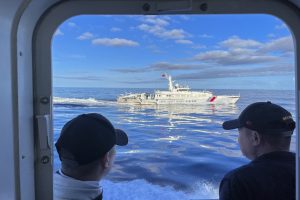The China Coast Guard (CCG) said yesterday that it had “allowed” the Philippines to evacuate a person who had fallen ill on a rusting warship grounded on a disputed shoal in the South China Sea.
The claim was made in a statement issued just hours after the Philippine Coast Guard (PCG) reported that it had faced “numerous obstructing and delaying maneuvers” from its Chinese counterpart as it carried out the medical evacuation at Second Thomas Shoal on Sunday.
PCG spokesperson Jay Tarriela said in a social media post that two PCG vessels rendezvoused with a rigid-hulled inflatable boat (RHIB) deployed from the BRP Sierra Madre, a rusting warship that Manila purposely grounded on the shoal in 1999.
“Despite the threatening presence of various CCG small vessels, the PCG RHIB was able to return to the main PCG vessel without further interruption. The sick personnel was then provided with urgent medical attention,” said Tarriela.
Late yesterday, the CCG said that it had monitored the medical evacuation operation but had allowed it to proceed “based on humanitarian considerations,” China’s Global Times reported. It said that this was made at the request of the Philippines.
PCG spokesperson Jay Tarriela responded on X by calling the Chinese statement “ridiculous.” The statement “further confirms their illegal deployment of vessels within our EEZ (exclusive economic zone) and highlights their government’s view that the preservation of human life and welfare requires approval.”
The exchange of statements represents the latest salvo between Manila and Beijing over the situation at Second Thomas Shoal, a low-tide elevation within the Philippines’ EEZ that China claims under its maximalist “nine-dash line.” China has seemingly singled out the shoal as the most vulnerable of the nine Philippine-occupied features in the Spratly Islands. Over the past two years, CCG vessels have made increasingly frequent and forceful attempts to prevent the Philippines from resupplying the small contingent of marines stationed aboard the Sierra Madre, while accusing Manila of violating past agreements not to transport construction materials to the rusting warship. (The Philippines denies all of these claims.)
This has resulted in a string of dangerous incidents in which CCG vessels have rammed and fired water cannons at Philippine patrol ships and supply boats. Among the most serious took place on June 17, in which eight Filipino personnel were injured, one of them seriously. The PCG also claims that China blocked an attempted medical evacuation on May 19.
The exchange of indignant statements came a day after China Foreign Ministry Spokesperson Mao Ning said that the Philippines was “allowed” to deliver supplies or evacuate personnel from the Sierra Madre – if it “notifies the Chinese side in advance.”
This creates a dilemma for the Philippines, which Ray Powell, the director of the SeaLight project at Stanford University’s Gordian Knot Center for National Security Innovation, told the Inquirer.
“For Manila to recognize Beijing’s stated pre-notification requirement – even for basic humanitarian missions – runs counter to Manila’s assertion of its freedom of navigation and resupply rights to its own outpost within its own exclusive economic zone,” Powell said.
Also this week, Manila and Beijing exchanged angry words after China’s Ministry of Natural Resources said in a report on Monday that the “illegally beached” Sierra Madre had “seriously damaged the diversity, stability and sustainability of the reef ecosystem” at Second Thomas Shoal. The Philippines’ South China Sea taskforce shot back by accusing China of having “caused untold damage to the maritime environment, and jeopardized the natural habitat and the livelihood of thousands of Filipino fisherfolk.”
The continued exchanges of rhetorical fire suggest that despite a pledge from both sides to de-escalate the tensions over Second Thomas Shoal in the wake of the June 17 incident, the situation remains febrile and potentially explosive.
































